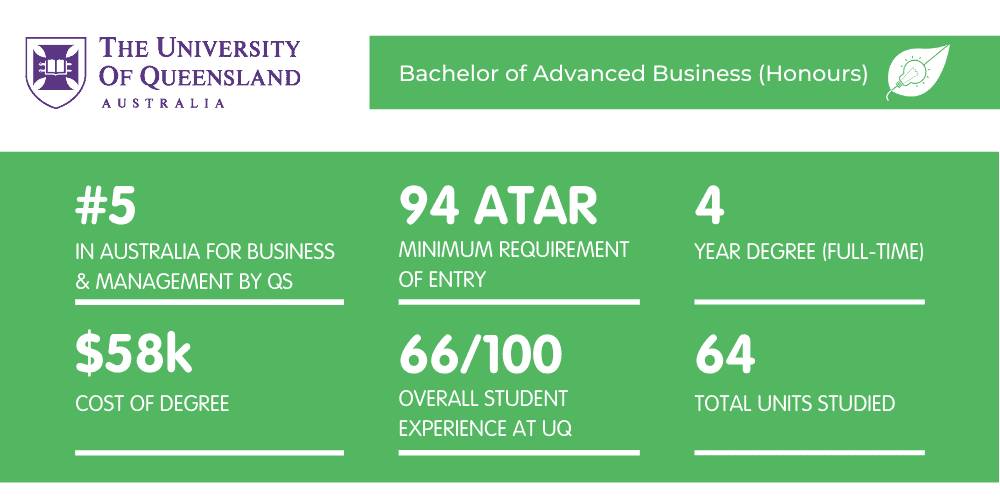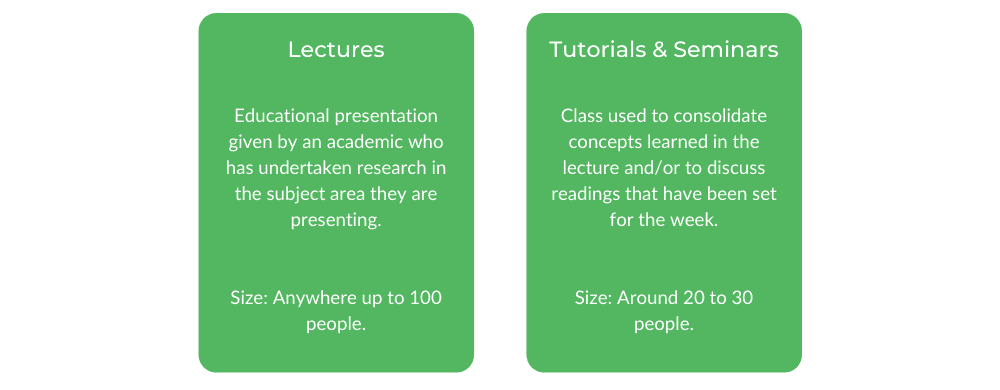Want to study and graduate from a Business degree that stands out from all the others or you’re still tossing up about taking a research pathway? Perhaps, studying a Bachelor of Advanced Business (Honours) at UQ might be the undergraduate degree for you!
This article unpacks all the essential info about this course, from its core units, teaching format to faculty and culture.
Let’s jump in!
What is a Bachelor of Advanced Business (Honours) at UQ?
Core Units and Majors
How to Get into a Bachelor of Advanced Business (Honours) at UQ
What’s the Teaching Format?
What’s the Faculty and Culture Like?
What is a Bachelor of Advanced Business (Honours) at UQ?
A Bachelor of Advanced Business (Honours) at UQ is a more personalised and rigorous study of Business. Rolled out in 2018, it is a fresh new approach to studying Business.
Unlike most Business undergraduates, it is taught in a small cohort and offers career pathways to leadership and professional roles as well as in academia. Students also have opportunities to practice these career skills through work-integrated and research units within the program.
This program can only be studied as a single degree and as an Honours program. However, pursuing the academic research pathway is up to the student.
Career pathways
Upon graduation, UQ Advanced Business students are eligible for certain accreditations from professional organisations. Career pathways generally depend on the student’s chosen majors and these options include:
-
- Finance manager
- Business analyst
- Business intelligence consultant
- International logistics adviser
- Financial crime analyst
- Business entrepreneur
- Auditor
- Marketing automation specialist
Core Units and Majors
There are 14 core units in this program for all Advanced Business students and are taught throughout the four years of the degree.
First Year
Your first year is basically just a whole bunch of core units — these include:
-
- Transforming Business with Information Systems
- Financial Management for Business
- Foundations of Marketing
- Entrepreneurial Mindset and Ideation
- Financial Accounting for Business
- Principles of Business Analytics
- International Business Management
- Introduction to Human Resource Management
In the first semester of first year, the core units contextualise the professional practice of business and include key contemporary issues of management, finance, entrepreneurship and information systems. Here, students practice applying context-based issues such as developing spreadsheets and responding to marketing-related problems.
In the second semester, more core theories are taught specifically within the various disciplines of finance (again), business analytics, business management and human resource management. These units will further help students decide on the majors they will specialise in.
Second Year
While students choose their majors in the second year, core units continue to focus on intermediate finance and law units. These subjects include:
-
- Management Accounting Principles
- Microeconomics for Business
- Macroeconomics for Business
- Business Law
These units teach various financial management principles and models, as well as the legal principles behind them.
For example, students will solve problems related to how individuals make choices in Microeconomics for Business and analyse the short-term effects of policies in Macroeconomics for Business.
Third and Fourth Year
The third-year core unit, Business Research Strategy, includes a research-orientated assessment, where students design, implement research methodologies and advance new knowledge of a key issue in their specific discipline.
Taught in the fourth-year, Leadership and Strategy Practicum is the last core unit and prepares students for professional practice. Here, students work on a contemporary project with partners from business and government, including firms such as Deloitte, EY, KPMG, and PwC.
What are the Majors?
Since Business encompasses a broad field of knowledge, there are eight majors offered in this degree. Students can choose up to two of the follow major options:
Students who want to pursue a Research Pathway Option only choose one major.
Are there any built-in internships placements?
There are no mandatory built-in work placements in the core units of the program. However, the elective Business Industry Placement offers an optional work-experience unit.
In addition, the fourth-year unit Leadership and Strategy Practicum offers on-campus experience collaborating with industry professionals.
How to Get into Bachelor of Advanced Business (Honours) at UQ
The ATAR cut-off for a Bachelor of Advanced Business (Honours) at UQ is 94.
While there are no pathway programs, the Subject Incentive Scheme offers up to 5 adjustment points if you have studied and achieved a grade of C or higher in Mathematics Extension 1 or 2 or a Language other than English.
The prerequisite subjects for this program are Queensland Year 12 (or equivalent) General English subject (Units 3 & 4, C); Mathematical Methods or Specialist Mathematics (Units 3 & 4, C). However, no additional assessments are required for this program.
Scholarships
Being granted a scholarship can be a great source of financial assistance and addition to your CV. For a Bachelor of Advanced Business at UQ, the most relevant scholarship is UQ Link Scholarship.
This is available for students who have experienced educational disadvantage due to financial hardship, where the recipient is awarded $3,000 per year for up to 3 years.
What’s the Teaching Format?
A Bachelor of Advanced Business at UQ is taught in semesters and typically in a combination of lectures, tutorials and seminars. Depending on the unit, either a traditional or online-blended learning mode is applied (for example, marketing units are usually taught in a blended learning approach).
Because of the small cohort size in a Bachelor of Advanced Business (Honours), most of these classes offer more personalised class dynamics.
Class Structure
Lectures
Lectures set out a foundational overview of weekly topics, wherein students watch the lecturer cover the degree content. Activities also include answering questions set out in the lecture such as understanding finance statements or the social context of a specific discipline.
In online recorded lectures, students must individually learn the lecture content through online modules. Core unit lectures have a class size of up to 100 students while major-specific units are much smaller with around 20 to 30 students; lectures are generally two hours long.
Tutorials and Seminars
Tutorials and seminars are similar classes, wherein the learning activities are more interactive. Typically, in these classes, lecture content is consolidated and practised in a group context.
For core units, tutorial and seminar activities include completing finance statements, writing investor pitches and working with collaboration softwares such as SparkTank; major-specific activities consist of more intermediate knowledge such using Excel for analysis and presentation, as well as connecting cognitive and social psychology with various trends.
Because of the small cohort size, both tutorials and seminars have around an attendance of 20 to 30 students. They are both 1-2 hours long.
How much time do you spend in classes?
In a Bachelor of Advanced Business at UQ, full-time students attend four units per semester. Contact hours are around 10 to 12 hours per week.
What are the assessments like?
The main types of assessments for this program include written assignments, exams and quizzes. While it varies unit to unit, the typical weighting structure consists of two 30% assessments and one 40% final exam.
Written assignments often include 2000-word reports and collaborative group assignments. In the reports, students individually research a specific issue and synthesise their ideas to provide valuable recommendations.
For group assignments, students are given a case study to solve and present in front of the class.
Mid-semester and final exams usually include a mix of multiple-choice and short answer questions that are both practical and theoretical.
Depending on whether there is a mid-semester exam in the unit, the final exam may assess all of the lecture content. For such exams, it is important that students stay on top of their classwork (although they should regardless!).
Skills That You Refine and Learn
The five main skills that are assessed in every Advanced Business unit are conceptual, communication, creativity, critical judgment, and ethical and social understanding skills.
In conceptual and critical thinking skills, Advanced Business students gain an in-depth knowledge of the unit content by learning how to rationally define and analyse issues.
Creativity skills relates to the innovative solutions that students independently create, while the communication of these ideas must be equally as refined so that they are relevant and timely to a various range of people.
Lastly, ethical and social understanding skills relates to the student’s ability to perceive and incorporate ethical standards to their ideas.
What’s the Faculty and Culture Like?
Faculty
In a Bachelor of Advanced Business (Honours) at UQ, the cohort is much more closer and familiarised than other business degrees. This is due to the size of the cohort and how new the degree is.
The teaching faculty is run by internationally respected industry experts and teachers, who offer in-depth support to their students.
Culture
Societies are great in helping students decide what field they might want to work in after uni. Students have really enjoyed events hosted by UQ Women’s Network, Financial Management Association of Australia (FMAA) and University of Queensland Business Association.
UQ Ventures programs are also a must for any UQ student interested in entrepreneurship, regardless of your faculty (so helpful, and free!).
Catered for all Advanced Business students, the University of Queensland Business Association offers a variety of events from Innovation Challenges, career advice talks (such as how to become a Certified Public Accountant) to pub crawls!
If you’re interested in the pros and cons of Advanced Business at UQ, check out our article here!
Support Programs
UQ offers mentoring programs for first-semester students to ease the transition from school to university life. Throughout the semesters, there are also study-skills workshops that offer general study guidance for students.
Check out the different mentoring programs available here!
Lynn Chen is a Content Writer at Art of Smart Education and is a Communication student at UTS with a major in Creative Writing. Lynn’s articles have been published in Vertigo, The Comma, and Shut Up and Go. In her spare time, she also writes poetry.






